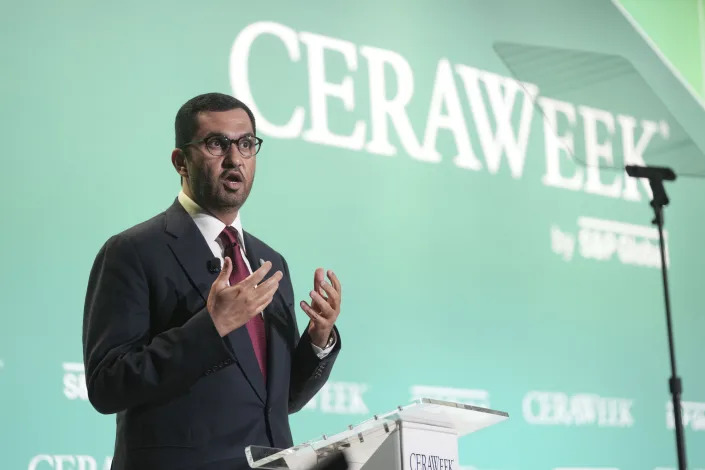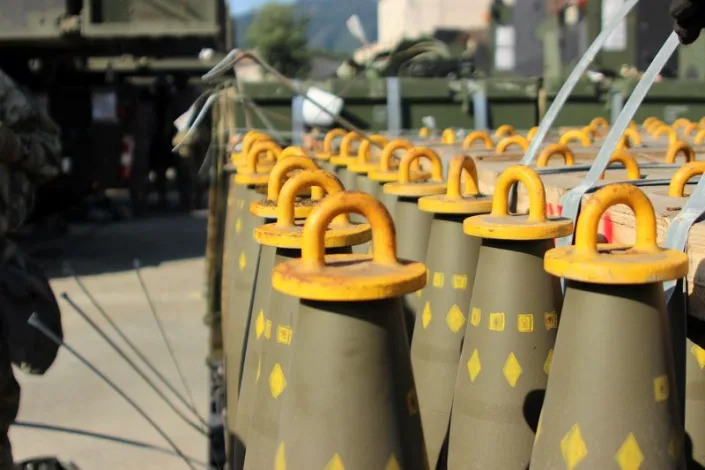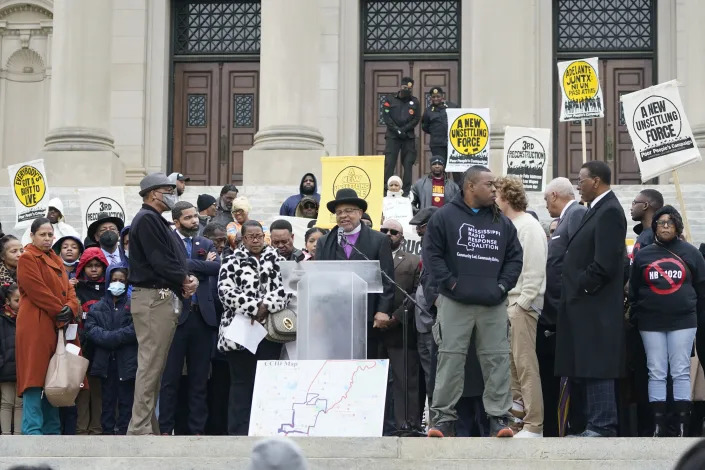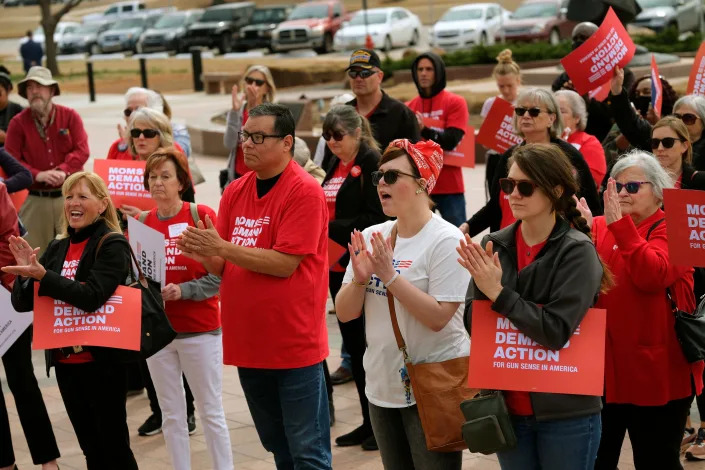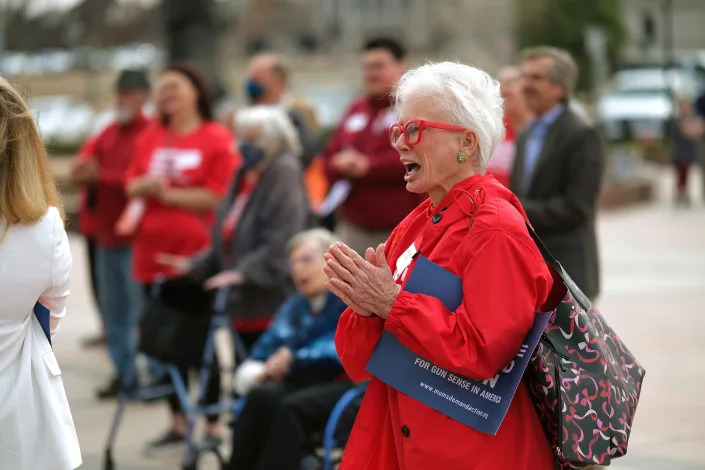



MyanmarMen pull a raft with several bodies onboard while crossing the Mu river between Myinmu and Sagaing townships in the Sagaing region in central Myanmar on Thursday, March 2, 2023. Soldiers in Myanmar rampaged through several villages, raping, beheading and killing at least 17 people, residents said, in the latest of what critics of the ruling military say are a series of war crimes since the army seized power two years ago. (UGC via AP)
GRANT PECK
Mon, March 6, 2023
BANGKOK (AP) — Soldiers in Myanmar rampaged through several villages, raping, beheading and killing at least 17 people, residents said, in the latest of what critics of the ruling military say are a series of war crimes since the army seized power two years ago.
The bodies of 17 people were recovered last week in the villages of Nyaung Yin and Tar Taing — also called Tatai — in Sagaing region in central Myanmar, according to members of the anti-government resistance and a resident who lost his wife. They said the victims had been detained by the military and in some cases appeared to have been tortured before being killed.
Myanmar has been in turmoil since the military’s February 2021 seizure of power from the elected government of Aung San Suu Kyi prompted nationwide peaceful protests that security forces suppressed with deadly force. The violence triggered widespread armed resistance, which has since turned into what some U.N. experts have characterized as a civil war.
The army has been conducting major offensives in the countryside, including burning villages and driving hundreds of thousands of people from their homes. It has faced some of its toughest resistance in Sagaing, in Myanmar’s historic heartland.
The soldiers involved in last week’s attacks were in a group of more than 90 who were brought to the area by five helicopters on Feb. 23, said local leaders of the pro-democracy People’s Defense Forces and independent Myanmar media.
They said the bodies of 14 people, including three women, were found Thursday on a small island in a river in Nyaung Yin. Three more male victims were found in Tar Taing, including two members of the local resistance. One of the two was dismembered, with his head cut off, they said.
The neighboring villages are about 45 kilometers (28 miles) west of the major city of Mandalay.
Tar Taing resident Moe Kyaw, 42, survived the attack but said his 39-year-old wife, Pan Thwal, and 18-year-old nephew were among those killed. Contacted by phone, he said Friday they were among 70 villagers detained in the middle of the night last Wednesday by soldiers who shot into the air as they herded their captives from their homes to the local Buddhist monastery.
Moe Kyaw said the soldiers stole beer and other items from his aunt’s small shop, and as they beat her, he fled for his life, escaping two soldiers who shot at him.
He said his wife and other villagers were tortured at the monastery and then taken away from the village, apparently as hostages against any attack. He said his wife and two other women were beaten, raped and shot dead on Thursday by the soldiers, who also took his spouse’s earrings, His two sons, 9 and 11 years old, were released when the soldiers departed, he said.
Moe Kyaw did not explain how he knew the details about his wife's treatment.
Myanmar’s underground National Unity Government — the main organization opposed to military rule that describes itself as the country’s legitimate government — said in an online news conference on Monday that the soldiers were from the 99th Light Infantry Division based in Mandalay Region.
A leader of a Sagaing resistance group called the Demon King Defense Force said his group attacked the better-armed government troops on Wednesday in a failed effort to rescue the detained villagers.
When they went Thursday morning to the small island where the soldiers had taken about 20 villagers they found 14 bodies in three spots, said the resistance leader, who asked not to be identified because of fear of reprisals by the military.
Acknowledging that he had not seen the killings, he said he also believed the women had been raped.
In an earlier incident apparently involving the same army unit, two boys aged 12 and 13 assisting the People’s Defense Force were captured by government troops on Feb. 26 and beheaded after being forced to show the locations of their camps, according to independent Myanmar media. Photos said to be of their bodies, found at Kan Daw village, about 12 kilometers (7 miles) northwest of Tar Taing, were circulated on social media.
A separate group, the Sadaung Lighting People’s Defense Force, has said that two of its older teenage members were also killed and beheaded in fighting at Kan Daw on the same day.
The military government has not responded to the allegations. In the past, it has denied documented abuses and said that casualties occurred in the course of fighting against armed anti-government guerrillas. Online media supportive of the military government have made the same claim about the recent incidents in Sagaing or suggested that they were the result of factional fighting within the resistance.
Myanmar’s military has long been accused of serious human rights violations, most notably in the western state of Rakhine. International courts are considering whether it committed genocide there in a brutal 2017 counterinsurgency campaign that caused more than 700,000 members of the Muslim Rohingya minority to flee to neighboring Bangladesh for safety.
Last week, U.N. High Commissioner for Human Rights Volker Türk accused the ruling generals of carrying out “a scorched earth policy in an attempt to stamp out opposition.”
His agency said credible sources have verified the deaths of at least 2,940 civilians and 17,572 arrests by the military and its allies since the 2021 takeover.



